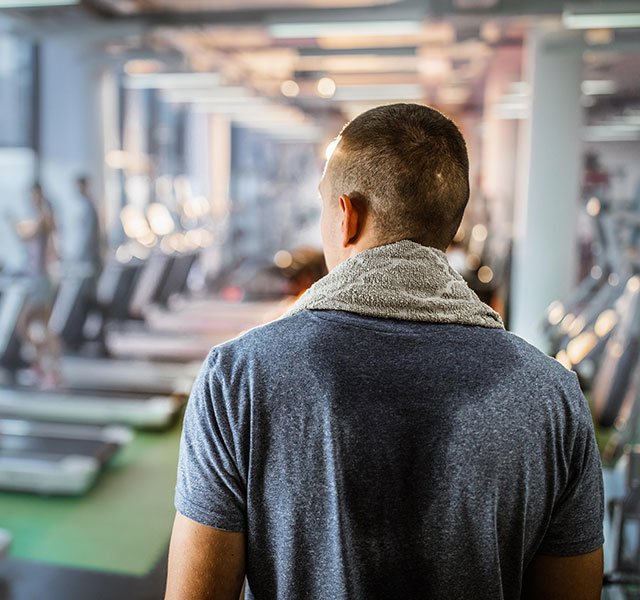Sweating can be messy (and stinky), but it’s also your body’s natural cooling mechanism. When your body temperature rises from exercise, heat, stress or hormone shifts, sweating helps keep your internal temperature at a comfortable 98.6 degrees Fahrenheit.
“Sweating helps release heat, which helps maintain optimal body temperature,” says Pamela Webert, an exercise physiologist at Henry Ford Health. “If we didn’t sweat, our bodies would literally cook from the inside out.”
Sweating Explained
Sweat is comprised mostly of water but it also contains sodium, chloride, potassium, calcium and magnesium. Someone who is not very in shape tends to lose more sodium in their sweat than a person who is fit. But everyone’s sweat is slightly different.
“Some individuals will lose more sodium in their sweat than others,” says Webert. If your sweat is salty — meaning it stings your eyes, leaves a gritty feeling on your skin or produces a sting on an open wound — you’re losing sodium, which you can replace with a sports drink.
The volume of sweat you produce depends on a variety of factors:
- Body size: Bigger people generate more heat because they have to move more body mass, so that means more heat generated and hence, more sweat. The greater surface area that comes with a larger body also requires more perspiration to cool it down.
- Age: Your body becomes less tolerant to heat as you age. “Sweat glands change with age, reducing the body’s ability to cool itself effectively,” says Webert.
- Muscle mass: Muscle mass produces more heat than fat. So even if two people have the same body weight, their sweat rate will differ based on their percentage of muscle mass.
- Health status: A number of health conditions and life stages can impact how much you sweat. Colds, flu and even mental health conditions such as anxiety and depression can impact how much you sweat. Hormone fluctuations in particular are often linked with an increase in internal body temperature. (Just ask any perimenopausal or pregnant woman!)
- Fitness level: People who are very fit sweat more than their less-fit counterparts. But if fit people and less-fit people are performing the same task, the less-fit person will sweat more because they have to expend more energy to perform the same task.
External factors also play a role in how much you sweat. If you’re running outside in 95-degree heat with 70% humidity, or participating in a hot yoga class, your body will sweat to keep your internal temperature down. Similarly, eating spicy foods or drinking caffeinated beverages can also increase your body temp, causing you to sweat out the excess.
Sweating and Fitness
During exercise in temperate conditions, the average person will lose about 1.5 to 2 liters of fluid through sweat. Add high humidity and heat to the mix and your rate of fluid loss can double.
If you’re exercising or playing sports for more than one hour, it’s important to replace the fluid you lose through sweat during the activity to prevent dehydration. Here’s how:
- Sip on a sports drink containing carbohydrates and electrolytes (sodium chloride, potassium, calcium and magnesium).
- Replenish lost fluids with 16 to 20 ounces of fluid per hour (four to six ounces for every 15 to 20 minutes)
Exercising for less than one hour? Opt for water over a sports drink, but make sure you hydrate sufficiently.
Don’t Sweat It
Even though sweating is normal, it isn’t always welcome. The smell of sweat and the appearance of sweat rings on your clothing can be embarrassing. You might use deodorant to cover up the odor or try an antiperspirant to dry out sweaty pits. Also try to steer clear of triggers, such as caffeine, spicy foods and hot beverages.
“Just keep in mind, sweating is an important mechanism that helps regulate your body temperature,” Webert says.
If you’re sweating excessively in specific areas, such as your palms or feet, you may have a condition called hyperhidrosis, which can be medically treated with prescription antiperspirants, Botox or surgery.
If you’re concerned about your sweating habits, talk to your primary care doctor to rule out medical causes and medication side effects.
To find a doctor at Henry Ford, visit henryford.com or call 1-800-HENRYFORD (436-7936).
Pam Webert is an exercise physiologist who sees patients and athletes at the William Clay Ford Center for Athletic Medicine in Detroit.



